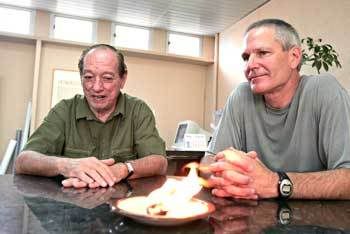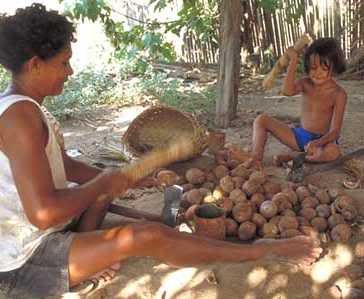Father of bio-jet fuel launches biofuel cooperatives in Brazil to reduce poverty

At 66 of age, doutor Expedito has never been so requested. His 'bioquerosene' (biokerosene) should be a way to reduce carbon dioxide emissions in aviation and to prepare for a gradual substitution of jet fuel. Parente's fuel was courted by both NASA and Boeing. Tests have been performed since mid-2006 and are believed to soon enter a decisive stage at Boeing’s facilities in Seattle. Contrary to bioethanol and biodiesel already established in road transportation worldwide, biojet fuel is a vegetable product which has still not been in commercial use.
For a long time, Expedito Parente (left in the pic) was a professor at Ceara Federal University in Fortaleza, a large city in Brazil’s Nordeste region. When he retired, this hyperactive academic wanted to continue to do something useful. In 2001, he thus founded Tecbio, a small engineering firm developing biodiesel refineries. It was nicely timed. Tecbio has now a staff of eighty and is growing exponentially. But Dr. Parente nourishes a double obsession: to be the first to make airlines adopt bio-jet fuel, an important technological step ahead of ordinary biodiesel, and producing this biofuel in Brazil in a socially correct way.
Babassu palms
 In 2005, professor Parente won the Blue Sky Award for his aircraft fuel project, "a kind of Nobel prize given by the UN for innovations in the field of renewable energies", he comments.
In 2005, professor Parente won the Blue Sky Award for his aircraft fuel project, "a kind of Nobel prize given by the UN for innovations in the field of renewable energies", he comments.Interest for the invention was confirmed at the beginning of this year at a Washington D.C. seminar organized by the Transportation Research Board, a government agency. Participants were confronted with an apparently absurd question: "May Babassu already be a renewable source to serve as substitute for jet fuel?"
This palm tree, unknown to most people in the West, grows in the wild on 18 million hectares (45 million acres) in Brazil's forest in the North East. Such size corresponds to six times Maryland or roughly half the size of Switzerland. It was Expedito Parente who discovered that the nuts of the babassu - or more precisely the kernels within - can be turned into an oil that possesses energetic properties which make it an ideal feedstock for bio-jet fuel.
There are certainly social and ecological arguments in favor of the babassu palm: its use does not compete with land for food production, nor does it imply deforestation as the palm grows in the wild and can thus be integrated in sustainable agro-forestry systems (earlier post):

bioenergy :: biofuels :: energy :: sustainability :: babassu :: biodiesel :: biokerosene :: bio-jet fuel :: poverty alleviation :: agro-forestry :: cooperative :: Brazil ::
Professor's comeback
In reality the discovery is not all that recent and babassu has been growing in Brazil for ages. But Professor Parente himself is making a spectacular comeback. In the 1980s he was the first in the world to patent biodiesel as an industrial process. He was acclaimed as the “Father of Biodiesel”. This brilliant academic was then asked to find a vegetable substitute for aircraft fuel. The product resulting from this research made a turboprop transportation airplane fly a distance of some 600 miles in 1984. So why did not aviation worldwide adopt his biokerosene? Parente explains:
At the time, petroleum prices went down dramatically. And we must understand that a fuel to be acceptable for modern jetliners has to be extremely reliable and resistant at very low temperatures, it is a complex product.There is a new dimension to what is at stake. To fly from London to Rio, and back, provokes individually as much CO2 emissions as those generated during fifteen months of sedentary life in a European capital, heating and local transportation included, if we are to believe comparative studies of environmental impacts. Already, air transportation operators supply travelers with different service contributions to buy, in compensation for greenhouse effect emissions.
Globally, airlines gulp down 26 billion gallons of fuel per year, and this figure may double in twenty years. 20 per cent of their operational costs correspond to fuel. For the first time in 2006, the fuel bill exceeded costs for staff in the sector. Sir Richard Branson, British business mogul, scorching supporter of many environmental causes, but mainly founder and president of the Virgin group which counts several air transportation carriers, said in a recent interview that "immediate solutions" should be found (earlier post).

Eco-taxes
Today, biojet fuel does not seem to be entirely competitive though, as jet fuel derived from petroleum is sold free from taxes at 1,5 USD per gallon, which is still very cheap.
Soon there will be eco-taxes on aviation fuel. And I am pretty sure that authorities will make it mandatory to blend conventional fuel with biojet when available. Costs will also shrink significantly when industrial production is started.But won't the land areas needed be gigantic? Doutor Expedito has a ready answer:
If 20 per cent of aviation fuel were to be produced in form of green fuel for blending, such volumes would correspond to some 30 million acres land. It’s a huge territory, I agree, but it is less than the existing Babassu forests.Cooperatives
Tecbio and its involuntarily hype boss have furthermore a very clear social vision. This is important to emphasize, as bioethanol mills using sugar cane as raw material has not reduced poverty in the Brazilian countryside. Seasonal plantation workers called boias frias (“cold billies”) have a hard time. Because of piece-work, a Brazilian cane cutter will only ‘last’ twelve years, less than a slave in ancient times, according to a recent study.
Professor Parente gets upset:
Such conditions are intolerable. We have our own model which pretends to reconcile social development and industrial dynamics. At present date, Tecbio is leading two pilot projects in collaboration with federal authorities. The idea is to create cooperative units, in association with the local population, for a socially correct production of biodiesel derived from Babassu kernel oil. Respecting the environment, this model should be replicated in other regions, for examples in deforested areas of the Amazon and in Africa.But is it not utopian wanting to assemble two operational methods which are normally dissociated: the small-scale traditional way versus output through high-tech plants ? Expedito Parente holds out his arms. He makes one think of a talented film maker who, after years of prospecting, has just received unlimited funds to shoot an ambitious picture based on an art script:
One has to be pragmatic. We work with feasibility from an economic point of view. Running a cooperative does not mean that it should not be profitable. In a basic scheme, each cooperative shall produce three million liters [800,000 gallons] of biodiesel/biojet fuel per year, together with several other products originated from the nuts. There will be some agriculture. All the electricity consumed in the cooperative shall be generated organically on the spot. Each cooperative is giving part-time jobs to 3,000 peasants. On the other hand we study also ecologically run Babassu plantations.To produce one billion liters of biojet fuel, [270 million gallons] at least 300 such cooperatives are needed. This is certainly a time-consuming project. Plans are allowed to be extensive though, changeover seems to be secured. Of four children, Doutor Expedito has one son working at Tecbio. At age 26 and a chemical engineer as his father, he already takes part in management. His name is premonitory : Expedito Parente Junior...
Copyright, Agoravox, 2007.
 --------------
--------------
 A 7.1MW biomass power plant to be built on the Haiwaiian island of Kaua‘i has received approval from the local Planning Commission. The plant, owned and operated by Green Energy Hawaii, will use albizia trees, a hardy species that grows in poor soil on rainfall alone. The renewable power plant will meet 10 percent of the island's energy needs.
A 7.1MW biomass power plant to be built on the Haiwaiian island of Kaua‘i has received approval from the local Planning Commission. The plant, owned and operated by Green Energy Hawaii, will use albizia trees, a hardy species that grows in poor soil on rainfall alone. The renewable power plant will meet 10 percent of the island's energy needs.









1 Comments:
National Algae Association
Algae: The Next Biofuel
Inaugural
Algae Commercialization
Business Plan and Networking Forum
April 10, 2008
www.nationalalgaeassociation.com
Post a Comment
Links to this post:
Create a Link
<< Home